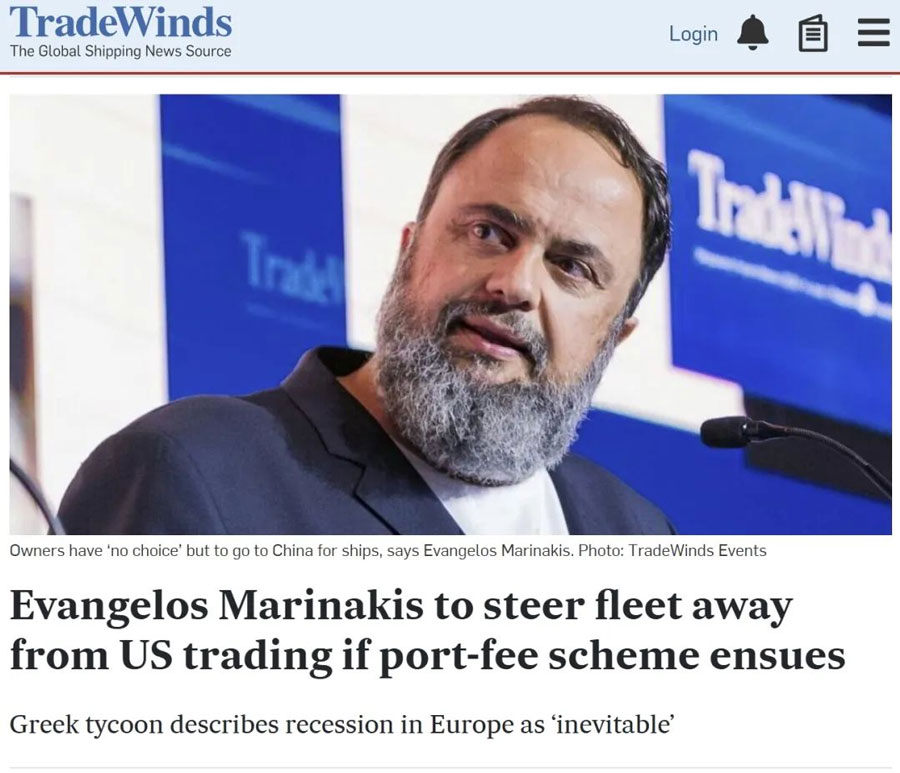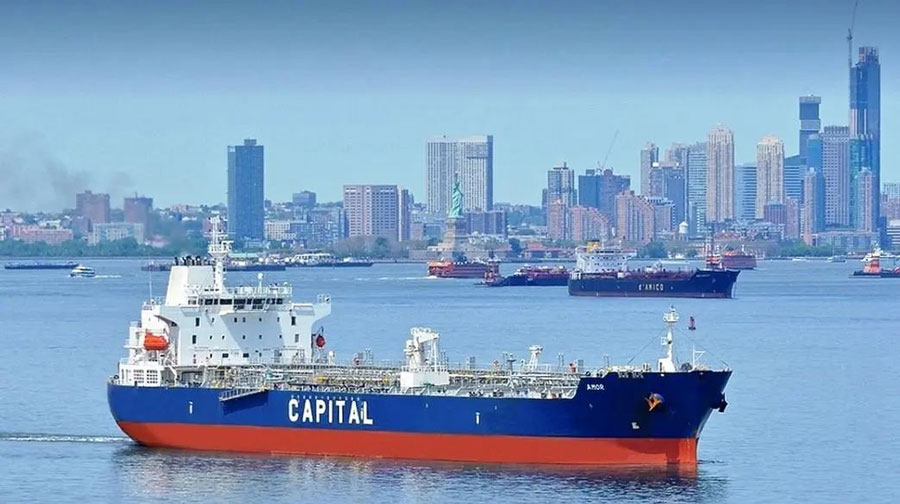

Hard steel Trump, all ships will withdraw from the US market
The Trump administration is once again waving the flag of trade protectionism, this time targeting China's shipbuilding industry. However, this policy has not yet landed, and the international shipping giants have begun to fight back. Greek shipping tycoon Evangelos Marinakis has made it clear that if the United States imposes port fees on Chinese-built ships, he will let all of his 140-plus ships avoid the U.S. market.
At the 19th Capital Link International Shipping Forum in New York, Marinakis was the keynote speaker on a number of current geopolitical issues. He believes that while some of these policies, such as tariffs, may pose challenges for the shipping industry in the short term, the long-term outlook for the industry remains positive and these fluctuations will ultimately benefit the shipping market.
Marinakis is the founder and chairman of Capital Maritime & Trading Corp. The Capital Maritime Group, controlled by the Marinakis family, manages a mixed fleet of more than 146 vessels in 2025, including tankers, container ships, LNG vessels, LPG/ammonia vessels, LCO2 vessels, offshore vessels and dry bulk carriers. Capital Group entered the LNG space in 2018, ordering up to 10 LNG vessels with a total value of $1.8 billion.
The Office of the United States Trade Representative (USTR) held a hearing last week to explore imposing additional fees on Chinese-built ships to "curb" the global dominance of China's shipbuilding industry. The reality, however, is that the international shipping market is far more dependent on Chinese yards than Washington imagines.
These "punitive" measures could have unintended consequences - disrupting supply chains, driving up the cost of US imports and exports, and undermining the international competitiveness of key sectors such as agriculture, energy and manufacturing.
Guy Platten, general secretary of the International Chamber of Shipping (ICS), testified at the meeting, warning that the proposed measures will not really curb the development of China's shipbuilding industry, but will most likely impact the U.S. maritime supply chain system, which will threaten U.S. energy, food and overall economic security. "Even US companies will eventually be 'cut off' by the ships on which they depend."
Marinakis also defended China's shipbuilding industry, stressing that Chinese yards remain an integral part of the shipping industry regardless of U.S. actions.
"Shipowners have no choice but to build in China for several reasons," Marinakis explains, "the first is capacity and the second is price competitiveness." Third, the fact is that the quality of shipbuilding in Chinese yards has improved significantly, and the standards of some yards are close to those of South Korea and Japan."
In the future, he predicts, there will be a clear "two-track" market, with some shipowners willing to continue to enter the U.S. market and others choosing to avoid it. "Ultimately, the consumer will pay."
In fact, it seems that shipowners are already preparing for this "dual-track" market. Brokers are reporting an increasing number of Japanese and South Korean-built vessels for sale, reflecting an increased preference for non-Chinese built vessels.
This change has already begun to be seen in the second-hand boat sale (SnP) market. In its latest weekly report, Xclusiv Shipbrokers noted that a total of 13 bulk carriers changed hands this week, of which 10 were built in Japan and only three were from Chinese shipyards.
The latest deals confirm this trend. Hong Kong shipowner Cido Shipping recently sold its Japanese-built "Fortune Wing" (55,650 deadweight tons, built in 2011) for about $16 million. A year older ship of the same size, the CS Sonoma, built by a Chinese shipyard, sold for just $11.3 million.
At the 19th Capital Link International Shipping Forum in New York, Marinakis was the keynote speaker on a number of current geopolitical issues. He believes that while some of these policies, such as tariffs, may pose challenges for the shipping industry in the short term, the long-term outlook for the industry remains positive and these fluctuations will ultimately benefit the shipping market.

Marinakis is the founder and chairman of Capital Maritime & Trading Corp. The Capital Maritime Group, controlled by the Marinakis family, manages a mixed fleet of more than 146 vessels in 2025, including tankers, container ships, LNG vessels, LPG/ammonia vessels, LCO2 vessels, offshore vessels and dry bulk carriers. Capital Group entered the LNG space in 2018, ordering up to 10 LNG vessels with a total value of $1.8 billion.
The Office of the United States Trade Representative (USTR) held a hearing last week to explore imposing additional fees on Chinese-built ships to "curb" the global dominance of China's shipbuilding industry. The reality, however, is that the international shipping market is far more dependent on Chinese yards than Washington imagines.
These "punitive" measures could have unintended consequences - disrupting supply chains, driving up the cost of US imports and exports, and undermining the international competitiveness of key sectors such as agriculture, energy and manufacturing.
Guy Platten, general secretary of the International Chamber of Shipping (ICS), testified at the meeting, warning that the proposed measures will not really curb the development of China's shipbuilding industry, but will most likely impact the U.S. maritime supply chain system, which will threaten U.S. energy, food and overall economic security. "Even US companies will eventually be 'cut off' by the ships on which they depend."

Marinakis also defended China's shipbuilding industry, stressing that Chinese yards remain an integral part of the shipping industry regardless of U.S. actions.
"Shipowners have no choice but to build in China for several reasons," Marinakis explains, "the first is capacity and the second is price competitiveness." Third, the fact is that the quality of shipbuilding in Chinese yards has improved significantly, and the standards of some yards are close to those of South Korea and Japan."
In the future, he predicts, there will be a clear "two-track" market, with some shipowners willing to continue to enter the U.S. market and others choosing to avoid it. "Ultimately, the consumer will pay."
In fact, it seems that shipowners are already preparing for this "dual-track" market. Brokers are reporting an increasing number of Japanese and South Korean-built vessels for sale, reflecting an increased preference for non-Chinese built vessels.

This change has already begun to be seen in the second-hand boat sale (SnP) market. In its latest weekly report, Xclusiv Shipbrokers noted that a total of 13 bulk carriers changed hands this week, of which 10 were built in Japan and only three were from Chinese shipyards.
The latest deals confirm this trend. Hong Kong shipowner Cido Shipping recently sold its Japanese-built "Fortune Wing" (55,650 deadweight tons, built in 2011) for about $16 million. A year older ship of the same size, the CS Sonoma, built by a Chinese shipyard, sold for just $11.3 million.





